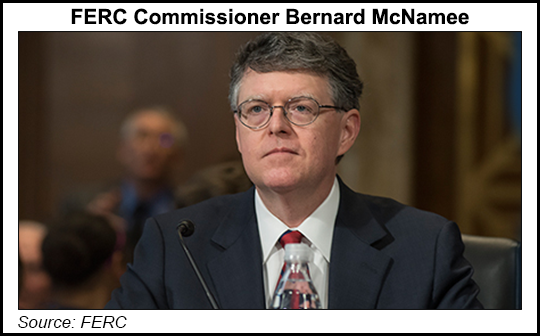Regulatory | NGI All News Access | NGI The Weekly Gas Market Report
McNamee, FERC to Consider Recusals ‘On a Case-by-Case Basis’
Commissioner Bernard McNamee has already recused himself from the docket of the Department of Energy’s (DOE) controversial 2017 notice of proposed rulemaking (NOPR) and is apparently considering taking similar action regarding FERC’s ongoing examination of the resilience of the nation’s power grid.

Based on Office of Government Ethics regulations, ethics statutes, case law and McNamee’s ethics pledge, further recusal determinations “are made on a case-by-case basis,” McNamee was advised in a Jan. 2 memorandum from Charles Beamon, the designated agency ethics official (DAEO) in the Federal Energy Regulatory Commission’s Office of the General Counsel.
Senate Democrats called on McNamee, a Republican, to recuse himself on grid resiliency and reliability issues that might come before FERC, based on McNamee’s involvement in crafting the DOE proposal to subsidize coal and nuclear power. During his confirmation process, the energy sector attorney pledged to serve as an “independent arbiter” if he were seated at FERC. In a Jan. 7 letter to Sen. Catherine Cortez Masto (D-NV), McNamee repeated that pledge.
“As I stated in my confirmation hearing, I pledge to be a fair, objective, and impartial arbiter in the cases and issues that will come before me as a Commissioner, and my decisions will be based on the law and the facts, not politics,” McNamee said. He attached a copy of Beamon’s memorandum and said he would continue to seek the guidance of the DAEO on recusal issues.
McNamee’s recusal from the NOPR docket, “is consistent with the case law,” according to Beamon’s memorandum [RM18-1]. Recusal from a related docket, in which FERC directed operators of regional wholesale power markets “to provide information as to whether FERC and the markets need to take additional action on resilience of the bulk power system,” is not required, though “we must exercise continued oversight,” Beamon said [AD18-7].
McNamee, who had served as executive director of DOE’s Office of Policy, was confirmed to FERC by the Senate and sworn in last month. At his first public meeting as a Commissioner Dec. 20, he cast a single, non-committal, “present” vote on the Commission’s lengthy consent agenda.
Senate Democrats have said McNamee’s “positions and statements suggest a lack of independence and an inappropriate predisposition on a number of topics likely to be involved in proceedings that will come before you in your new role as FERC commissioner.” Environmental groups, including the Natural Resources Defense Council, Earthjustice, Sierra Club and the Union of Concerned Scientists have also called on McNamee to recuse himself from cases related to federal efforts to bail out the coal and nuclear industries.
DOE’s NOPR called for FERC to impose rules on independent system operators and regional transmission organizations “to ensure that certain reliability and resilience attributes of electric generation resources are fully valued.” The rule would have allowed “for the recovery of costs of fuel-secure generation units that make our grid reliable and resilient,” according to DOE Secretary Rick Perry. Eligible units would have to “be able to provide essential energy and ancillary reliability service and have a 90-day fuel supply on site in the event of supply disruptions caused by emergencies, extreme weather, or natural or man-made disasters.”
Coal and some electricity organizations supported the NOPR, while natural gas industry groups vehemently opposed it.
FERC currently has four members — Chairman Neil Chatterjee and McNamee, who are Republicans, and Cheryl LaFleur and Richard Glick, who are Democrats. FERC commissioner and former Chairman Kevin J. McIntyre, who had been battling cancer since 2017, died Jan. 2. The 2-2 Republican-Democrat alignment leaves open the possibility that partisan divides could stall some projects under consideration by FERC, according to some analysts.
LaFleur, who served as chairman from July 2014 until April 2015 and as acting chairman on two other occasions, is serving a term due to expire at the end of June. McNamee’s term expires in 2020; Chatterjee’s in 2021; and Glick’s in 2022.
The White House has given no indication of who President Trump might nominate to fill the vacant fifth seat at FERC, but it is a foregone conclusion that it will be a third Republican. Among those rumored to be under consideration for nomination in September in addition to McNamee was Art Graham, chairman of the Florida Public Service Commission.
© 2024 Natural Gas Intelligence. All rights reserved.
ISSN © 1532-1231 | ISSN © 2577-9877 | ISSN © 1532-1266 |
